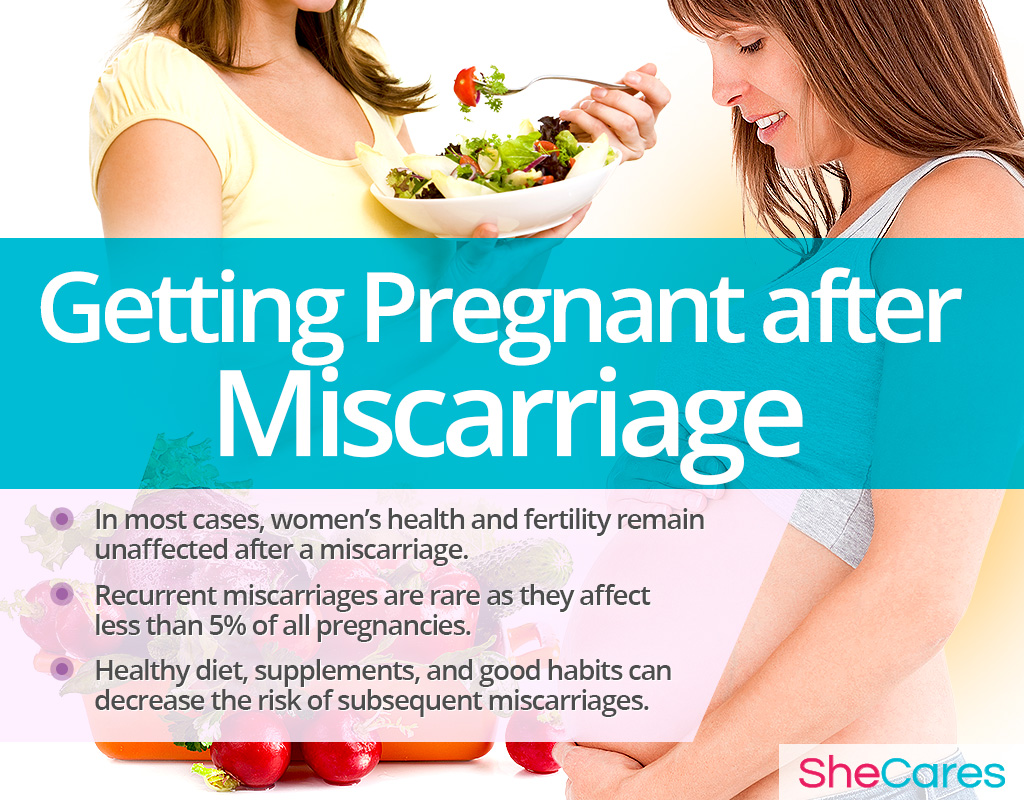Brief Overview of Miscarriage
Miscarriage is a loss of pregnancy, which occurs within the first 20 weeks of gestation. A big portion of miscarriages happen shortly after implantation, often before a woman realizes she is pregnant.
It is estimated that miscarriages affect up to 25% of all pregnancies. Although it is the most common pregnancy complication, in the majority of cases, a single cause of a miscarriage cannot be determined. Recurrent miscarriages, defined as two or three pregnancy losses, happen to less than 5% of women.
Effects of Miscarriage on Getting Pregnant
Effects on Fertility
A woman's period typically returns within six weeks after a miscarriage. Numerous studies have shown that fertility after a miscarriage is not diminished, unless experiencing the following issues:
There were additional complications involved with the miscarriage itself.
A woman has uncontrolled chronic conditions, such as diabetes or sexually transmitted infections (STDs).
A woman is experiencing recurrent miscarriages.
In this case, her ability to conceive and sustain a pregnancy must be thoroughly evaluated to rule out a more complex underlying cause of pregnancy loss or evaluate the extent of complications after the previous miscarriage.
Effects on the Mother
Generally, a miscarriage does not negatively affect a woman's physical health. Some women, however, develop a hemorrhage or uterine infection called a septic miscarriage, which is accompanied with fever, abdominal pain, and smelly vaginal discharge.
Most aspiring mothers tend to experience a wide spectrum of emotional difficulties after losing their baby. These might include feelings of guilt, confusion, or persistent sadness, sometimes developing into depression. A small percentage of women delay subsequent pregnancies in fear of another loss.
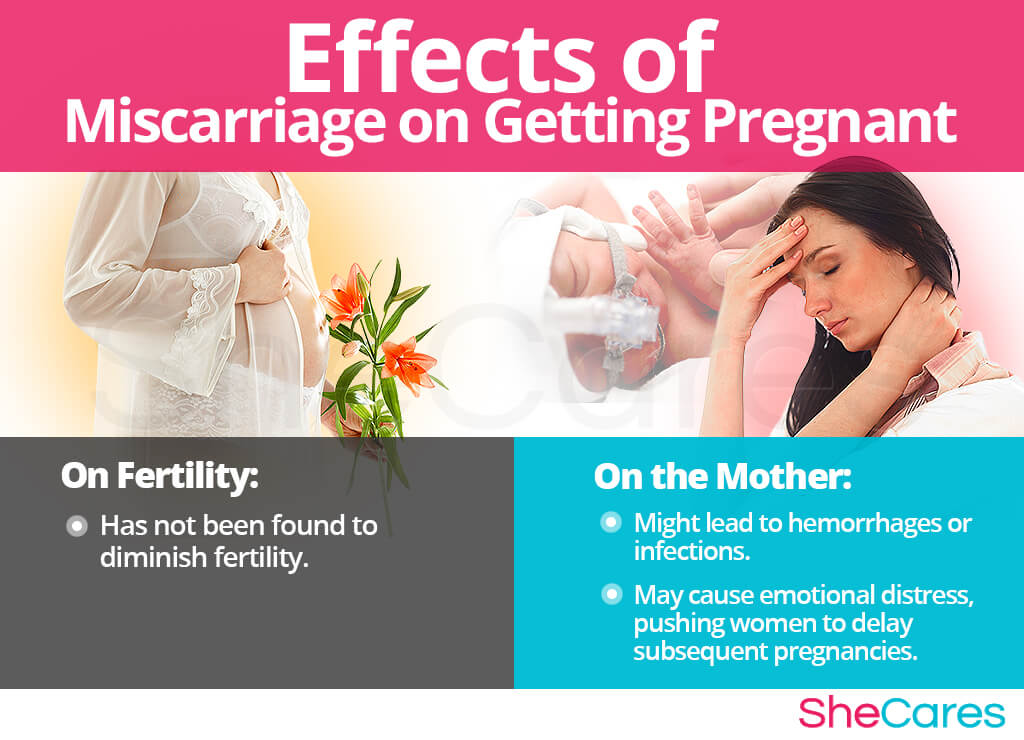
Action Plan
Even though a woman's period returns to normal within a few weeks and so does her ability to get pregnant, the standard recommendation is to wait at least three months. This time allows the uterus to heal and menstrual cycles to stabilize.
However, some studies have shown that women who conceive sooner have slightly higher chances for a live birth as long as they are cleared to get pregnant again.
Because most miscarriages happen without a clear cause, the best strategy to reduce the risk of another pregnancy loss is to adequately address the risk factors and reinforce healthy habits.
Months Prior to Conceiving
Your goal is to give your body time to heal after a miscarriage and optimize your health before getting pregnant again. Depending on your individual health status, this plan might include the following strategies:
Healthy Diet
Malnutrition and being over- or underweight, resulting from poor diet or eating disorders, put women at a higher risk for miscarriages. Consuming a wholesome diet might effectively provide sufficient nutrition to improve your fertility and help you successfully get pregnant.
Phytoestrogenic foods: beans, flax seeds, or barley
Whole grains: quinoa, brown rice, or buckwheat
Full-fat fairy: cheese, yogurt, or whole milk
Lean protein: fish, eggs, or chicken
Fruits and vegetables: spinach, berries, or sweet potatoes
Exercise
As you prepare for conceiving again, you might be scared to exercise in fear that it will trigger another miscarriage. However, studies have shown that partaking in physical activity is essential for fertility and will help your body support the demands of carrying a human being.
- Choose the type of activity you enjoy, remembering to keep its intensity at moderate-level and trying to get 150 minutes of exercise per week.
- Brisk walking, swimming, or yoga are great ideas to stay fit and healthy for a safe weight.
Supplements
Certain nutritional deficiencies and hormonal imbalances have been linked to miscarriages. They can be easily resolved with proper supplementation, such as:
- Prenatal vitamins include a wide spectrum of vitamins and minerals, such as folic acid or iron, which can boost your fertility and prevent pregnancy complications.
- Hormone-regulating supplements, like Macafem, are essential for promoting hormonal balance, regular menstruation, and good quality eggs, all of which are necessary for healthy conception.
Diagnostic Testing
Many obstetricians treat a single miscarriage as a natural part of a woman's reproductive efforts. Therefore, it is unlikely that you will be ordered to undergo specialized testing.
However, if you suffered from two or more consequent miscarriages, you and your partner might be referred for a number of diagnostic tests:
- Blood tests to detect hormonal imbalance or other irregularities
- Genetic testing to rule out chromosomal abnormalities
- Medical procedures, such as an ultrasound or hysteroscopy, to rule out uterine problems
Medications
Although in most cases, fertility is restored a few weeks after a miscarriage, some couples do experience some difficulties conceiving. For this reason, they might be prescribed fertility medications short-term to boost their chances of getting pregnant.
Psychotherapy
Grieving is a natural process after losing a baby. You should take your time to come to terms with your loss before you conceive again. Certain mental health issues, such as depression, have been linked to fertility problems.
- Consider psychotherapy with a licensed mental health professional if you need guidance as you cope.
- Surround yourself with people who can support you and make you feel safe.
- Take advantage of numerous local support groups or free help lines to aid you in your distress. Remember that you are not alone and help is readily available.
Good Habits
- Abstinence from sex is recommended for at least two weeks after miscarrying to prevent infections.
- Quitting your addictions is crucial to a successful pregnancy as smoking, excess alcohol, and illicit drugs have all been linked not only to miscarriages, but also to birth defects.
- Acupuncture can be helpful in alleviating stress and anxiety, both of which can negatively affect fertility.
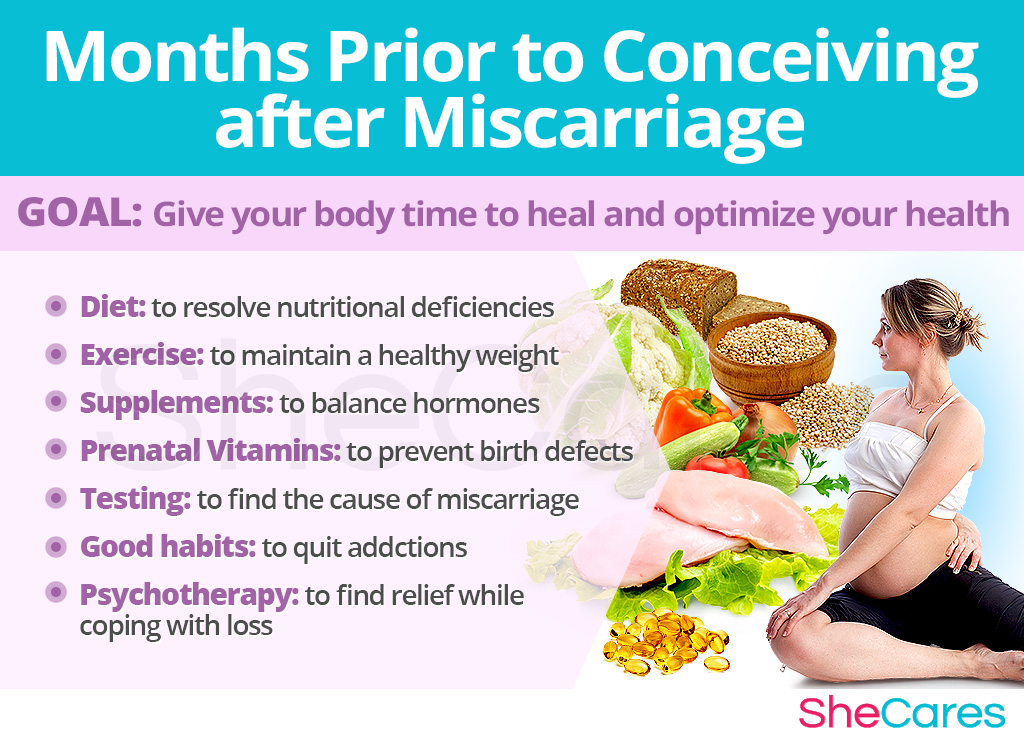
Tips for Conceiving after Miscarriage
When you are physically and emotionally ready, you may begin your efforts to get pregnant. Naturally, this might evoke a number of conflicting feelings in both partners.
- Partake stress reduction techniques to prevent its inhibitory effects on your fertility.
- Focus on fertility-friendly foods, such as fish, avocado, eggs, and plant-based protein.
- Stay well hydrated to make vaginal mucus more sperm-friendly.
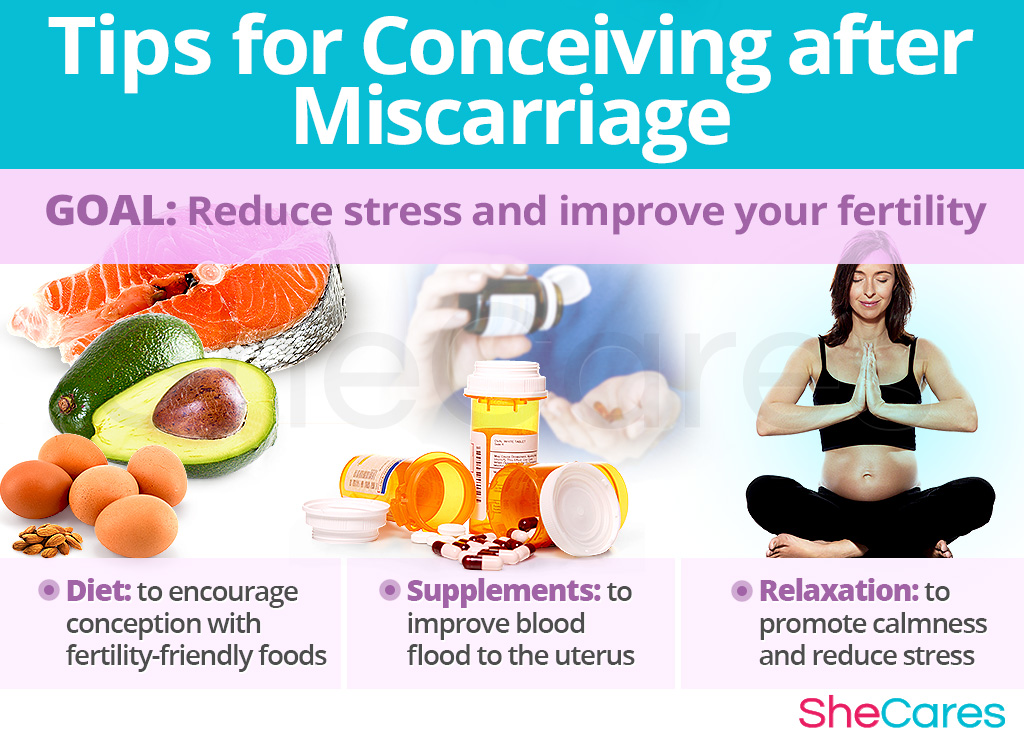
Pregnancy after Miscarriage
When you successfully get pregnant again, you will very likely feel more anxious and scared, considering your previous experience. To promote peacefulness and reduce stress, consider the following recommendations:
Maintain frequent doctor's check-ups to prevent your mind from being overwhelmed with doubts and fear.
Practice meditation or yoga to stay calm and positive and encourage your mind to stay in the present moment, as opposed to jumping between the past and what if's.
Continue your healthy habits that have proven successful so far, which includes eating well, getting a good night's sleep, and taking care of your mental state.
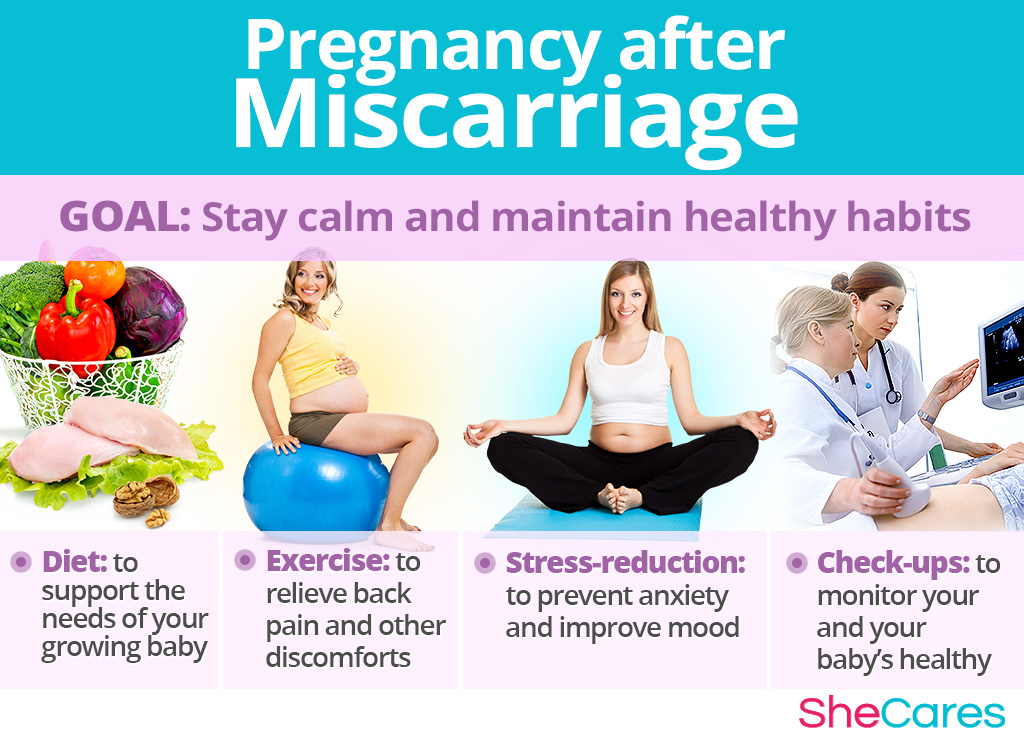
Key Takeaways
It is always useful to remember that in most cases, a loss of pregnancy is not related to something you did or did not do. Most women do not experience difficulties in trying to get pregnant after a miscarriage. Taking the time to heal and prepare for getting pregnant again with a healthy diet, exercise, and supplements, like Macafem, can help you convert those difficult experiences into something positive and hopeful, something that can directly benefit you and your baby.
Sources
- American Pregnancy Association. (2015). After a Miscarriage: Getting Pregnant Again. Retrieved February 15, 2018 from http://americanpregnancy.org/pregnancy-loss/after-miscarriage-getting-pregnant-again/
- American Psychological Association. (2012). Miscarriage and loss. Retrieved February 15, 2018 from http://www.apa.org/monitor/2012/06/miscarriage.aspx
- Cochrane Database of Systematic Reviews. (2016). Vitamin supplementation for preventing miscarriage. Retrieved February 5, 2018 from https://www.ncbi.nlm.nih.gov/pubmedhealth/PMH0012521/
- Mayo Clinic. (2016). Pregnancy after miscarriage: What you need to know. Retrieved February 15, 2018 from https://www.mayoclinic.org/healthy-lifestyle/getting-pregnant/in-depth/pregnancy-after-miscarriage/art-20044134
- Medline Plus. (2018). Miscarriage. https://medlineplus.gov/miscarriage.html
- National Institutes of Health. (2016). Trying to conceive soon after a pregnancy loss may increase chances of live birth. Retrieved February 15, 2018 from https://www.nih.gov/news-events/news-releases/trying-conceive-soon-after-pregnancy-loss-may-increase-chances-live-birth
- Pregnancy, Birth & Baby. (n.d.). Miscarriage. Retrieved February 5, 2018 from http://www.pregnancybirthbaby.org.au/miscarriage
- Rush University. (n.d.). Pregnancy After Miscarriage. Retrieved February 15, 2018 from https://www.rush.edu/health-wellness/discover-health/pregnancy-after-miscarriage
